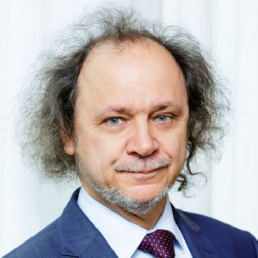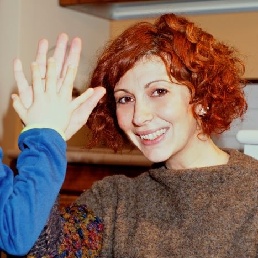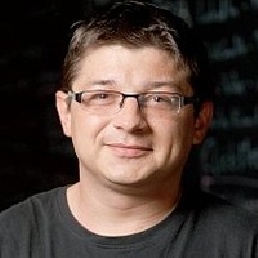Humans learn about the world using their senses. Sometimes, modern technologies limit human sensory experience. For example, when instead of directly touching and tasting nature, one experiences it only through a television monitor or by scrolling a screen of a smartphone. On the other hand, technologies expand human sensory experience by allowing people to see and hear things or sounds, which they would never know otherwise, for example while playing video games or being immersed in Virtual Reality. However, the latest technological advances and the constantly expanding body of knowledge about the human brain make it possible for people, whose senses have been damaged or have degenerated (e.g. the hearing- or sight-impaired individuals), experience the surrounding world again. Our guests from California, Professor David Eagleman from Stanford University, a world-renowned neuroscientist and the writer and presenter of The Brain, an Emmy-nominated television series, and Professor Piotr Winkielman from the University of California, San Diego and SWPS University, one of the most acclaimed Polish scientists researching relations between social cognition, emotions, embodiment and consciousness, will tell us how technology is being used to improve the sensory experience of people, who in some way have been deprived of that joy.
The meeting will be hosted by Konrad Maj, Ph.D., Head of the HumanTech Center for Innovation for Social and Technological Innovations, SWPS University.
Lanuages of the event: Polish and English (with translation to both languages).
April 15
18:00-21:00 CEST (UTC+2)
online
HumanTech Meetings
We live in an era of innovation, technological progress and digitalization. This current innovation drive may lead to unpredictable psychological and social outcomes. Therefore, it is crucial to establish collaborations between engineers, programmers, IT specialists and social scientists during initial phases of any new projects related to development of new technologies or services. Such collaborations may help to avoid mistakes and can support better development of new ideas.
The project is planned as a series of meetings, gathering academics and professionals from the technology sector from Poland and other countries. Each meeting will include two lectures, one delivered by a speaker from Poland and one presented by a guest from another country. The lectures will be followed by panel discussions, where panelists will represent different approaches to innovation and technology.
HumanTech Meetings is a project of SWPS University's Center for Innovation. More information »
One may say that the coronavirus pandemic has heightened our awareness of the role the senses play in daily life, because every other day, we hear that someone contracted the virus and has lost the sense of smell and taste. This loss is only temporary. However, there are people who are blind or deaf (sometimes both) since birth, or as a result of ilness or an accident. The latest technologies may enable them to enjoy colors and sounds again, and this is one of very few areas, which do not pose ethical dilemmas related to human-technology relationship.
Konrad Maj, Ph.D., Head of the HumanTech Center for Innovation for Social and Technological Innovations, SWPS University
Lecture 1: Creating new senses for humans - David Eagleman Stanford University, USA
What would the world be like if we could expand our senses beyond the capacities that we come to the table with? To explore this possibility, we feed sensory signals into the brain through atypical sensory pathways. For example, we can address the limitations of deafness by turning auditory information into a series of vibrating patterns on the skin. This is done via Buzz, a small wristband with vibratory motors in the band. But Buzz isn’t only for hearing loss: we’re using it to feed in all kinds of information streams, from infrared to olfactory information to the stock market. Using this approach of sensory substitution, we can translate and feed almost any kind of data through the skin – thus expanding the human sensory experience.

Professor David Eagleman – is a neuroscientist at Stanford University, an internationally bestselling author, and a Guggenheim Fellow. He is the writer and presenter of The Brain, an Emmy-nominated television series on PBS and BBC. Dr. Eagleman’s areas of research include sensory substitution, time perception, vision, and synesthesia; he also studies the intersection of neuroscience with the legal system, and in that capacity he directs the Center for Science and Law. Eagleman is the author of many books, including Livewired, The Runaway Species, The Brain, Incognito, and Wednesday is Indigo Blue. He is also the author of a widely adopted textbook on cognitive neuroscience, Brain and Behavior, as well as a bestselling book of literary fiction, Sum, which has been translated into 32 languages, turned into two operas, and named a Best Book of the Year by Barnes and Noble. Dr. Eagleman writes for the Atlantic, New York Times, Discover Magazine, Slate, Wired, and New Scientist, and appears regularly on National Public Radio and BBC to discuss both science and literature. He has been a TED speaker, a guest on the Colbert Report, and profiled in the New Yorker magazine. He has spun several companies out of his lab, including Neosensory, a company which uses haptics for sensory substitution and addition.
Lecture 2: Seeing and doing feelings: Using technology to understand and improve emotion recognition and social behavior - Piotr Winkielman, University of California, San Diego
How do people understand others – their feelings, intentions, and behaviors? These fundamental questions puzzle psychologists, cognitive scientists, and philosophers. They also are crucial in helping individuals with deficits in emotion and social perception. Professor Winkielman will tell us how technology can offer better insights into the basic mechanisms of social mind and how it can also lead to novel therapeutic interventions.
Professor Piotr Winkielman, (PhD 1997 Michigan) – is professor of psychology at the University of California, San Diego. He also holds an appointment at SWPS University of Social Sciences and Humanities in Warsaw, Poland. His research concerns the relation between social cognition, emotion, embodiment, and consciousness. He explores these topics using psychological and biological approaches. Dr. Winkielman’s research has been supported by grants from NSF, NIMH, and NAAR. He is a fellow of APS and SPSP. He co-edited books Emotion and Consciousness and also Social Neuroscience. He has served on the editorial boards of the Journal of Personality and Social Psychology and Personality and Social Psychology Bulletin. He was associate editor of Emotion, and also of Psychological Review.
Panel Discussion & Panelists

Professor Włodzisław Duch – is the Head of the Neurocognitive Laboratory in the Center of Modern Interdisciplinary Technologies, and the Neuroinformatics and Artificial Intelligence group in the University Centre of Excellence Dynamics, Mathematical Analysis and Artificial Intelligence. He also works at the Department of Informatics at Nicolaus Copernicus University in Toruń, Poland. From 2003 to 2012, Professor Duch was Visiting Professor at the School of Computer Engineering, Nanyang Technological University, in Singapore. He served as the President of the European Neural Networks Society for two terms (2006-2008-2011). In 2013, he was elected to the College of Fellows of the International Neural Networks Society. From 2014 to 2015 he served as the Deputy Minister for Science and Higher Education of Poland, and form 2011 to 2014, he held the post of Vice-President for Research and ICT Infrastructure at Nicolaus Copernicus University in Toruń.
More information: https://www.is.umk.pl/~duch/index.html

Monica Gori, Ph.D. – is the Principal Investigator of the Unit for Visually Impaired People (U-VIP) of the Italian Institute of Technology (IIT). Her lab comprises 18 researchers (9 psychologists and 9 engineers). Monica Gori is an experimental psychologist with a Ph.D. in Humanoid Technologies. She is an expert on development, multisensory integration, rehabilitation, and visual disability. Her contribution to science is exemplified by 130 international papers, 5 book chapters, and many conference abstracts. Internationally recognized impact and productivity indexes show that her work was cited 2,400 times, which places her in the top 25% of the H-index (ORCID ID orcid.org/0000-0002-5616-865X; Scopus Research ID: 23491803400; ResearcherID: A-1238-2014). She was the scientific coordinator of two large European grants, ABBI (~€2 million) and WeDraw (~€2.5 million). One of her works has been listed in the faculty of 1000 (Gori et al. Curr Biol, 2008). In 2012, she won the TR35 prize for young innovators. In 2020 Monica won an ERC STG with the MYSpace project. The project started in January 2021. https://www.iit.it/it/people/monica-gori

Przemysław Kuśmierek – is an entrepreneur and founder of MIGAM (migam.org), a company facilitating communication between businesses and hearing-impaired clients, which thanks to the Virgin Academy program, attracted an interest and investment of Sir Richard Branson. Mr. Kuśnierek is also a founder of Work Without Barriers (pracabezbarier.eu), and a video contact center platform (ommi.io), enabling effective online communication, sales, and customer service for businesses and clients. In 2016, he won the Polish edition of the Chivas Venture competition promoting socially active businesses. He was also recognized as one of the innovation leaders in the 2014 New Europe 100 ranking organized by Res Publica, the Visegrad Fund, Google, and the Financial Times. In 2013, Mr. Kuśmierek was nominated to the World Summit Awards, a competition organized by the United Nations, and won the prestigious Nominate Trust award that recognizes projects eliminating digital exclusion. He is a graduate of a two-year ELITE Program offered by the London Stock Exchange Group. Professionally, Przemysław Kuśmierek is a Certified Project Manager PRINCE2, PMBOK, as well as CISCO and Microsoft engineer. He is a founding member of the Polish Crowdfunding Society and an active participant in numerous events devoted to innovations in Poland and around the world.
The panel will be hosted by Professor Mirosław Filiciak, Director of the Institute of Humanities, Dean of the Faculty of Arts and Social Sciences in Warsaw, Head of the Department of Cultural Studies at SWPS University. Media expert interested in the relationship between new media and cultural participation. His research interests include the Internet, computer games, transformation of television, contemporary culture, and informal distribution of information. Full bio »
Meeting Host
Konrad Maj, Ph.D. – Social psychologist, Head of the HumanTech Meetings project, initiator and Head of the HumanTech Center for Social and Technological Innovations. In his research and teaching he focuses on social influence, media psychology and innovations. Recently, he has been working on a Human-Robot-Interaction (HRI) project. From 2013 to 2016 he held the post of Rector’s Representative for Research, focusing on practical application of research results and social innovations. He visited numerous innovation centers, including the Institute for Social Innovation (ISI) at Carnegie Mellon University, Pittsburgh, USA, the ID+ Research Institute for Design, Media and Culture at the University of Averio, Portugal, and Design Factory at Aalto University, in Finland. Full bio »
Organizer
HumanTech Center for Social and Technological Innovation >>
Main Partner

Partners

Media Support

Sponsors

Date and Location
Thursday, April 15, 2020, online
Contact
Coordinator: Ewa Łuczak
e-mail: This email address is being protected from spambots. You need JavaScript enabled to view it.
The HumanTech Meetings project is funded by the Ministry of Science and Higher Education, under the “Promotion of Science” funding scheme - contract no. 792/P-DUN/2019.